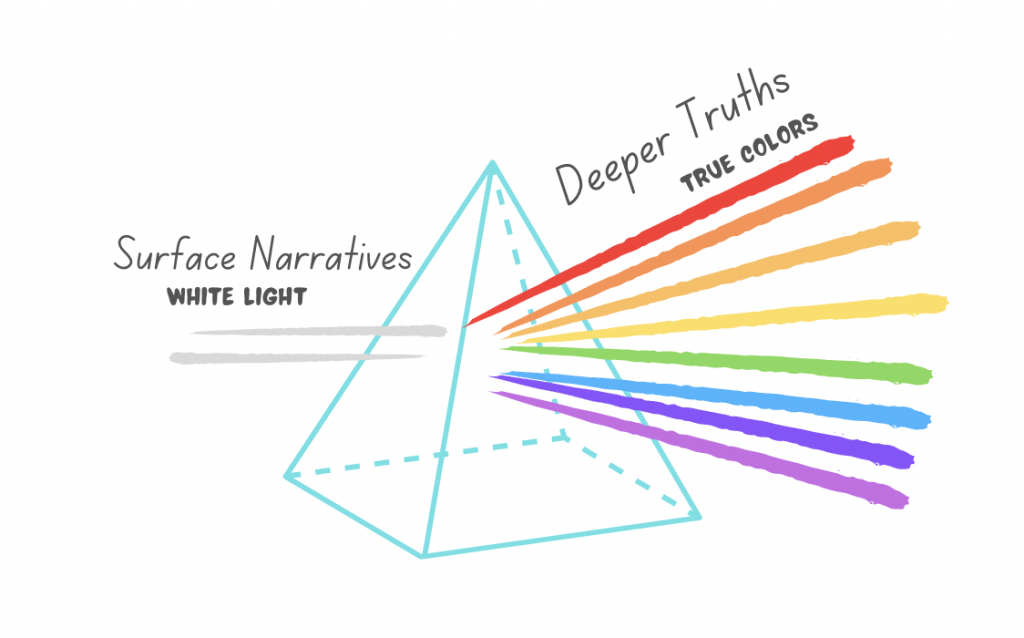
A guest post by Evy Peña, NGFP2021 Forced Labour Awardee, who works with SOIF on Sprout, a programme aimed at nurturing next generation leaders dedicated to children’s well-being and safety, with Ignite Philanthropy.
Evy is a social justice advocate and narrative specialist with experience in leadership development, communications, and advocacy across the Americas, Europe, and Sub-Saharan Africa. She supports various movements, including children’s rights, immigration, gender, and labour.
The stories we tell shape the world we live in. From the news on TV to the assumptions baked into policies and everyday conversations, narratives seep into how we see ourselves, engage with one another, and look at the world. They quietly dictate who gets opportunities, holds power, and is marginalised—both now and in the future.
Shifting power requires shifting narratives. In my work with survivors, advocates, and funders, I stress the need to make the invisible visible—by noticing, labelling, and analysing the implications of the stories we are telling.
Consider “child protection” units in organisations worldwide that have historically received significant funding from private and public sources. By framing children’s initiatives around protection alone, we can overlook the ultimate goal of ensuring children are safe and free to thrive. Protection-based framing is self-defeating, narrowing the types of programmes and solutions that can be funded. It also undermines a crucial element of achieving that goal: agency—children’s ability to understand their rights, report abuse, seek justice, and support one another. Alternatively, an agency-centred framing could redefine the starting point, emphasising children’s active role in shaping decisions that affect them, such as gun violence and education.
Framing is not just a matter of language; it actively shapes the way we think and approach solutions.
Research shows that language doesn’t simply express our thoughts—it shapes them. This is why there’s growing recognition of the need to invest in narrative work. But where do we begin?
The Prism tool: a step-by-step guide
Shifting narratives can feel daunting. That’s why I developed Stories Through the Prism, a tool designed to support movement-builders recognise the stories shaping our understanding of people, systems, and issues by uncovering the deeper truths hidden within surface-level narratives.
Try this:
- Gather a group. If everyone shares a similar role or expertise, the conversation can dive deeper into focused insights. Alternatively, bringing together individuals from various sectors—such as advocates, policymakers, and funders—yields a broader vision.
- Identify the surface narratives. Begin by discussing the dominant stories or assumptions circulating about the issue or group you’re focusing on. These could stem from media portrayals, cultural norms, or institutional perspectives. List them on the left side of the Prism.
- Explore the deeper truths. Move to the right side of the Prism to uncover the complexities that are often overlooked in surface narratives. What parts of the story are missing?
NOTE: Surface narratives shouldn’t be viewed as false while deeper truths are seen as absolute; in many cases, both can hold truth. Narratives may be incomplete or contradictory, but recognising this reveals the complexity of human experiences and social issues.
Group Reflection:
- Who is telling these stories?
- Why are these stories being told this way? Are there power dynamics, biases, or interests shaping the narrative? Who benefits from these stories?
- How do surface narratives reinforce the status quo?
- How can we amplify these deeper truths? Discuss concrete ways your group can challenge surface narratives and highlight the fuller, more complex stories.
We are the Prisms
At the end of the exercise, participants will begin to recognise their role in uncovering and reframing narratives. By translating and amplifying deeper truths, we can align our strategies with our vision for justice.
If you are interested in sector transformation using tools like Prism, get in touch.
